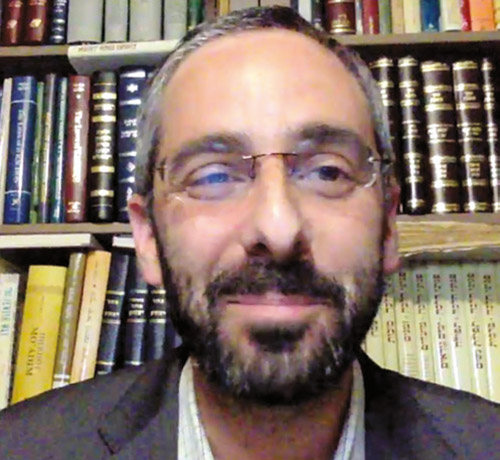



On April 21, SAR virtually presented “Remapping the Home in the Age of Corona,” the final installment of its three-part “Living Through Change in the Age of Corona” Zoom series. The evening’s panelists included Rabbi Jonathan Kroll, SAR High School’s principal; psychiatrist Dr. Michelle Friedman; and HIR’s Senior Rabbi Steven Exler. SAR High School teachers Tammy Jacobowitz and Simon Fleischer moderated.
Jacobowitz began: “In the last year, the home, the place where we eat, sleep and get dressed, became the site of everything. The goal tonight is to hear from professionals in our community who helped countless families; learn from them to expand our individual vantage points; and move forward with hope, vision and empathy.”
Rabbi Kroll reflected on his students’ social and emotional well-being. “Over the past year, we’ve had an extraordinary increase in the number of students who have experienced mental health issues, at a time when it’s difficult to find therapists, with waiting lists a mile long,” he said. “We’ve seen an increased number of students who needed inpatient treatment because their social muscles haven’t been exercised enough.
“For the first time, parents have seen their kids crying. The CDC has found children’s mental health-related ER visits are up 25%; 71% of students reported more stress and anxiety; and 91% reported negative impact from the pandemic, fear and worrying about their own health and the health of loved ones.”
Rabbi Kroll added: “Most parents and kids with whom I’ve spoken identify the crisis as being a result of limited, constrained social interactions and the isolation experienced. We also have reports of many students experiencing an improvement of mental health and general well-being. It depends on the personalities of these students. Those students who normally thrive in social settings are feeling starved for social interaction. Those who may be much less comfortable in social situations have grown to appreciate not having to come up with excuses.”
Rabbi Kroll’s second issue was students’ free time, as the school day now ends earlier than the usual 5:10 p.m. “Only 5% of parents responded to maintain the same dismissal time as pre-pandemic. While kids coming home earlier made for a better family experience, having no after-school sports and activities has been too limiting. We plan on keeping an eye on how that vacuum of time gets filled. School has the responsibility for students’ family lives, as well academic lives.”
Dr. Friedman addressed issues of lockdown; loneliness or isolation among single people; stresses on marriage; and less privacy or “secret quiet time.” She said: “People told me how they missed their commutes home, a zone in between worlds and identities. I spoke to people who had three or four dogs, a cat and a bird in their house.” She described increased use of alcohol, especially among women, as well as stress-eating and weight gain. An entire college class graduated last June, but many have not entered the workplace yet. Dating was pretty much reduced to set-ups and meeting online.
Rabbi Exler described “DIY Judaism” as “becoming the primary purveyors of religious experience in our own lives.” He cited praying at home since shul was closed; and without a Zoom option on Shabbat, the inability to be guests at someone else’s Seder; no Purim carnival holiday; and purchasing a shofar instead of attending Rosh Hashanah services. “In DIY Judaism, we took on more than we might be accustomed to doing. Many may be relieved by the opportunity to return to having other individuals and institutions re-assume those roles.”
On adult children moving back, Rabbi Exler noted dichotomies of good and bad communication; more closeness and sharing space; intergenerational households; and shifting back to households as they were. There was an increase in domestic abuse and violence, with victims trapped at home with their abusers.
Rabbi Exler praised a culture of neighborliness, especially WhatsApp groups. “Through Zoom, we peered into other’s homes when we couldn’t physically cross the threshold,” he said. “We relaxed expectations in the decor or mess. We are a little more comfortable welcoming each other virtually into our homes.” He hopes it will translate into sharing our homes with more community members, in a wider circle than before.
Closing the event and series, Fleischer commented: “Vaccinations are seemingly effective and abundant. At the same time, we’re hearing about viral mutations. We’re watching the numbers of losses continue to climb. Our goal in these panel discussions has been to look backwards and forwards simultaneously to settle into the present moment, even while anticipating better times ahead.”
By Judy Berger













